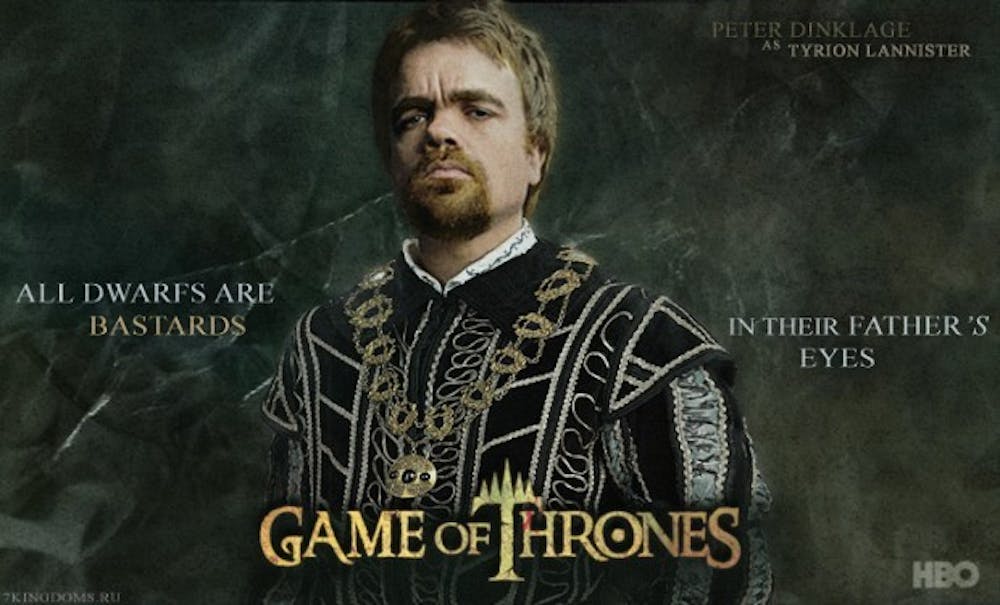 Game of Thrones aired their final episode of the season with a full length finale on HBO (Photo courtesy of HBO Corp.)
Game of Thrones aired their final episode of the season with a full length finale on HBO (Photo courtesy of HBO Corp.)With fans across the globe are still traumatized over last week's Red Wedding melee, Sunday's season finale of "Game of Thrones" allowed viewers to take in one last catatonic breath of television brilliance.
Following the form of the past two seasons, this year's finale, "Mhysa," did not provide the sort of shocking violence and dreadful wonder seen in the penultimate episode, but instead did its best to provide a bridge between this season and the next.
That is not to say "Mhysa" did not achieve epic proportions.
It did so with skillful and graceful guile, taking on the gargantuan task of weaving together at least six plot threads, complete with six different locations and a plethora of characters, both new and old.
And though the violence was negligible, it was more than consequential as Arya Stark (Maisie Williams) notched her first kill and Jon Snow (Kit Harington) was gunned down by the (non-fatal) arrows of his former lover.
The final frayed strings of the severed Stark kin are still managing to keep their heads above water while keeping up viewers' hopes as they fight on the side of good.
Even Bran Stark (Isaac Hempstead-Wright) and his pack of human oddities (including the hilarious one-word wonder Hodor) have somehow managed to remain unharmed as they reach the Wall and find safe passage north to attempt to accomplish whatever it is they are there for.
This is one of the more intriguing story lines, especially for those of us who have not yet read the books, as Bran's supernatural capabilities seem to be inevitably linked to the foreshadowed White Walker onslaught.
Meanwhile, Samwell Tarly (John Bradley) makes a triumphant return to Castle Black and becomes a prophet, warning the Night's watch (and subsequently the Seven Kingdoms) of the impending threat of the harrowing White Walkers.
Tarly's return to the Castle fits perfectly with the rest of the paradoxical character shifts that occur in Game of Thrones. As many viewers will recall, the season began with the pudgy and awkward Tarly barely surviving among the Crows, and it seemed an almost foregone conclusion that he would be the first to be killed off.
It is ultimately Tarly's character thread that will unite the Seven Kingdoms to fight against the grisly White Walkers, sooner rather than later.
The aftermath of the Red Wedding also had compelling repercussions as the decrepit but boastful Walder Frey (David Bradley) is as repulsive as ever, lurking in the shadows, eating sausage with his fingers and musing about his excitement to pick a new wife as he discusses his new position as Lord of Riverrun.
The backhanded manner by which the foul old man gained his position is almost as offensive as his demeanor and the choice of actor as well as the set and lighting come together to create a perfectly vile and detestable storm.
Meanwhile, in King's Landing, the utterly sickening Joffrey Barratheon (Jack Gleeson) has become exponentially obnoxious and infuriating, redefining the word irksome and leaving viewers praying to the gods, both new and old, that someone would dispose of him in some god-awful fashion. At the peak of one of his power-hungry rants, Joffrey vows to (literally) serve Sansa Stark her brother's head on a platter and refers to Tyrion as a "little monster," as he reminds his uncle that he is the king and that everyone is his to torment.
Here, "Game of Thrones's" literary creator George R.R. Martin's penchant for hilarious irony sparkles as Tyrion has spent the last season becoming increasingly likable and progressively intelligent, while his hateful (and hate-able) nephew has done the exact opposite.
Tywin Lannister (Charles Dance) is quick to diffuse the situation as he reminds the King's Council (and viewers, but probably not the incorrigible King himself) that "any man who must say 'I am the king' is no true king."
Twyin sends Joffrey to bed without supper reminding viewers who is truly at the seat of power in King's Landing and providing a faint gleam of hope that perhaps the young King's time is coming to an end. Unfortunately it won't be this season.
It wasn't all bad though, as across the Narrow Sea, the episode ended on a colorful and optimistic note as Daenerys Targaryen (Emilia Clarke) further cemented her role as the unlikely liberator (and most likely to recapture the Iron Throne) as she expanded her army by freeing the slaves of Yunkai and crowd-surfing across the emancipated multitudes while they chanted "Mhysa" (mother in their native tongue). Some might find the "white savior" role a tired literary cliché, but it is the fact that Daenerys is a woman who herself escaped a form of slavery that is of significance.
Daenerys is unlike the rest of the Iron Throne's suitors in that her pursuit of power seems just, logical and at times even righteous, therefore making her one of the few likable highborn character's (with power) left. Not to mention she is the only woman with power who isn't yoked by gender expectations and male dominance.
The finale was just another reminder (the tenth this season) of why "Game of Thrones" is pure television gold. It never falls victim to predictable cliches, and in doing so, it sets itself miles apart — even worlds away — from other television shows.
It's mesmerizing, polarizing and tortuous, and ultimately, it's why we can't wait until next season.
Reach the reporter at npmendo@asu.edu or follow him on Twitter @NPMendoza




